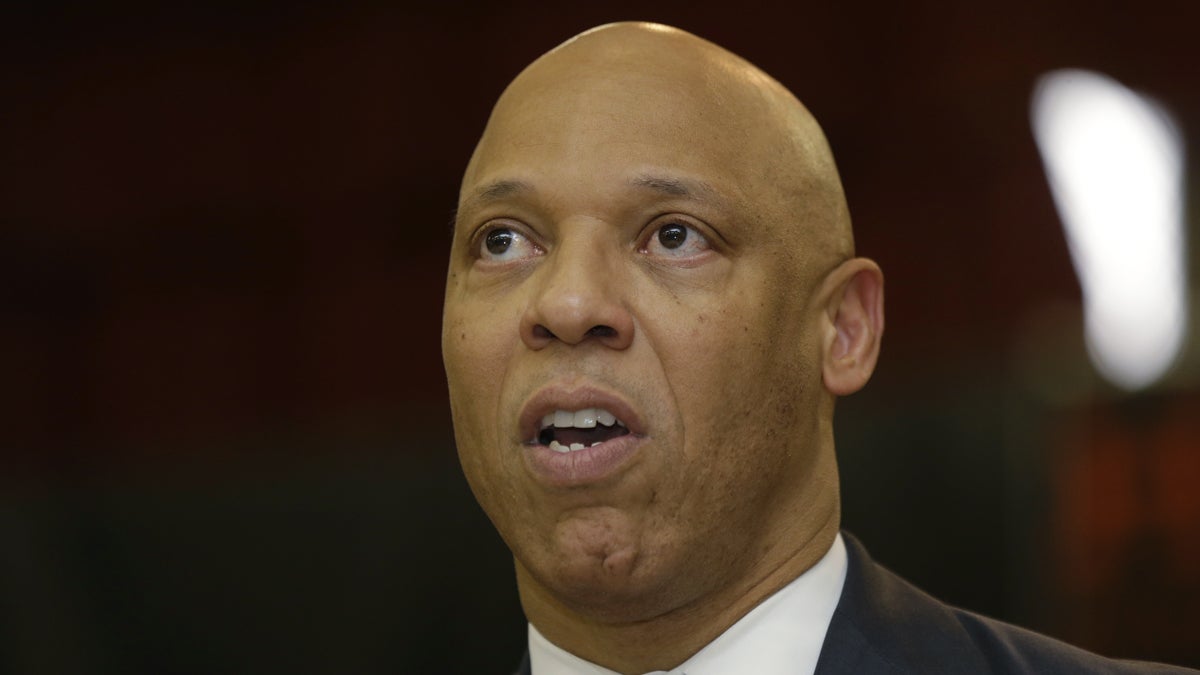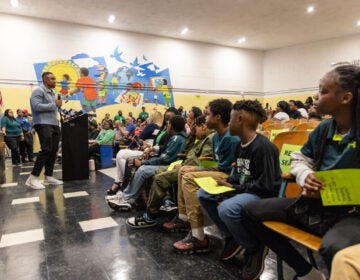Hite: Philly schools can’t open safely without $50 million from city

Philadelphia Superintendent William Hite said he needs $50 million to bring back essential workers who were laid off in June.
[Updated] Philadelphia Superintendent William Hite said he will not open all city schools on time on a full-day schedule unless he is assured by the end of next week that he will get $50 million in promised new funding from the city.
Because of the school district’s budget shortfall, he said he would either need to delay the Sept. 9 starting date for all schools, open just some of the city’s 218 schools, or run on a half-day calendar.
“I am deeply frustrated,” Hite said. “Our students are the most important part of this equation. … They did not create these circumstances, yet they will be most impacted by any delay.”
Hite’s announcement set off a new round of disputes between Mayor Michael Nutter, who said he backs Hite’s stance, and City Council President Darrell Clarke. Clarke, along with some other Council members, dislikes Nutter’s recommended approach to finding the money.
If the school district gets a guarantee of the $50 million, Hite said that would enable him to bring back about 1,000 of the 3,800 employees laid off in June.
Assistant principals, guidance counselors, noontime aides, secretaries and teachers were among those who received pink slips last June. So far, the district has only been able to restore about 286 secretaries and traveling music teachers.
“Fifty million dollars allows us to tell parents that when their child is walking through the hallways, eating lunch or at recess, an adult will be supervising them,” Hite said. “It allows us to tell parents that counselors will be available to serve children in our largest and neediest schools.”
Four district principals, who accompanied Hite during his press conference Thursday, also cautioned against opening schools without additional funding.
Linda Carroll, principal of Northeast High School, said the district would be putting her in an impossible situation with 3,000 students and a skeletal staff.
“Just imagine in any venue in America you have 3,000 teenagers and 1 adult,” she said.
Sticking point in City Council
The $50 million in city funding is a key piece of Gov. Tom Corbett’s plan to fill part of the school district’s budget gap, which was originally a whopping $304 million.
Corbett and the Pennsylvania General Assembly permitted the city to extend a local 1 percent sales tax that was enacted as mid-recession “emergency” measure, and was due to expire next budget year. The idea was that the city could borrow $50 million on behalf of the school district against future sales tax revenues this year, while $120 million of those proceeds would be earmarked for the schools in future years.
Though that wasn’t his first choice, Nutter said Thursday that he supports Corbett’s sales-tax plan as the only way to give Hite the resources he needs when he needs them.
“Other ideas have been offered and we’ve explored them,” he said. “Unfortunately, they just don’t work with the time allotted. … I will settle for nothing less than our schools being opened safety and securely … as they were scheduled on Sept. 9.”
But City Council, which is on summer recess until Sept. 12, has not extended the sales tax so far.
The sticking point involves Philadelphia’s pension crisis. Council President Clarke wants to split the sales tax revenues between the schools and the city’s deeply underfunded pension system. He criticized the Corbett plan, which he said was not crafted with sufficient Council input.
“I don’t think we should sign on to what I and other members believe is a bad deal simply because we want to come up with a short-term funding stream that is questionable,” he said.
Jane Roh, Clarke’s spokeswoman, said earlier this week that the disagreement over the sales tax revenue should not affect the city’s ability to borrow $50 million for the schools.
Clarke also floated an alternative Thursday to help fund the school district: having the city buy assets and surplus properties from the district for $50 million. He said the city could move quickly on this plan.
District officials said Council does not need to reconvene or pass legislation in order to be sufficiently assured that the $50 million will arrive. Roh said Clarke’s plan will allow Council to provide that guarantee by the end of next week.
Additionally, Clarke said Council members would like to get a sense of what the teachers’ union might put into the pot in the way of concessions.
Few options
Nutter’s view is that Clarke’s proposed split of sales tax revenue between the schools and the pension system could work only if the state legislature approved the city’s pitch to levy a cigarette tax for the district. Then that new tax revenue would replace the sales tax proceeds that the schools would lose to pensions.
But Nutter’s aides noted that could not happen until after state lawmakers returns from their summer recess in late September. And the legislature gave the cigarette tax idea a cool reception when Nutter pitched it earlier this year.
Councilwoman Maria Quiñones-Sánchez, meanwhile, has proposed another plan. She wants to give the schools a one-time grant of up to $50 million, dipping into budget reserves. But Nutter and his team say draining the modest reserve would be a bad idea for a city that could be hit by surprise costs from any number of directions.
Parent Dawn Hawkins, a member of Action United, said she supports Hite’s stand. To her, City Council and Nutter are passing the buck.
“City Council knew that this was going to happen. They all went on vacation,” she said. “They have to realize that these children’s education is on the line. These children’s safety is on the line.”
WHYY is your source for fact-based, in-depth journalism and information. As a nonprofit organization, we rely on financial support from readers like you. Please give today.




